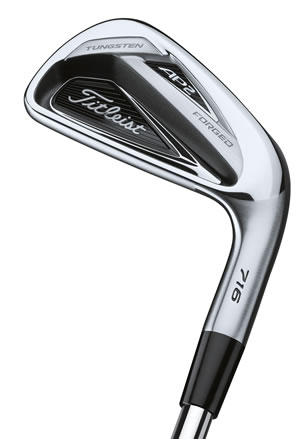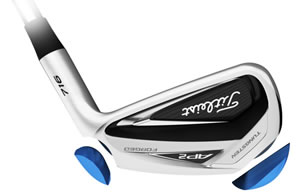Titleist AP2 716 Irons: The AmateurGolf.com Review
20 Dec 2015
by Pete Wlodkowski of AmateurGolf.com
see also: Equipment Reviews
SHARE:
In both the golf ball and equipment categories,
Titleist
tends to build on their winners, utilizing the Tours,
and
their extensive East and West Coast test facilities,
as
proving grounds.
It’s pretty logical if you think about it, and
in the case of the AP2 irons – that won the first
three
majors of 2015 – it was extra important to validate
the latest design. The resulting product, the AP2 716,
provides even more forgiveness than its
predecessor,
but that’s just the beginning. If you’re
playing one of the previous models of AP2, you
would
be wise to get your “numbers” and on-
course feedback with the AP2 716. (I’m
guessing most of you don’t use iPhones that
are more than one or two product cycles old, lest
you
lose out on the latest advancements. Same goes
here.)
FIRST GLANCE
 |
No matter
what
angle you look at it
the new AP2 716 is a
beautiful iron |
There’s no question about it – this latest
model looks fantastic. They beg to be hit. When I
put
them through the paces on the practice range, I
grabbed the wedge and nine iron first. I love the
look
of the AP2 short irons. At address, and impact, I
wasn’t disappointed. Playing off tight lies I
had no trouble taking a small divot and getting
excellent launch and ball flight. The AP2 716s have a
pre-worn leading edge, which helps on tight lies.
And
the amazing forged feedback is wonderful in such a
forgiving club.
THE FORGIVENESS FACTOR
Prior to the official launch date, we had a chance
to talk to Chris McGinley, Vice President of
Marketing
at Titleist, and he gave us his perspective on
forgiveness.
"Tour players don't typically ask for more
forgiving clubs," says McGinley. "But
when you provide it they certainly don’t
complain.”
So in the case of the number one cavity back
iron
on Tour, Titleist paid attention to not messing up a
good thing (the looks and feel) while letting their
engineers take perimeter weighting to the limit. On
the 3-7 irons (where you need low CG and high MOI
the most) Titleist used 25% more Tungsten in the
AP2 716s than their predecessor.
“For the AP2 716, our designers shaped the
Tungsten to the perimeter,” said McGinley.
“They didn’t worry about how it would
be made.”
While that kind of design may have caused
Titleist engineers to wrack their brains (and
computers) a bit, the co-forging process they
developed to get the job done will likely help them
make future enhancements easier.
SHAFT OPTIONS: ANOTHER BIG
REASON TO LOOK AT AN UPGRADE
You may not have heard of “Dynamic Gold
AMT” (unless you spend a lot of time on the
equipment-dedicated websites) but you’re
going to. McGinley is particularly excited that Titleist
is the exclusive OEM launch partner of this unique
shaft, which Tour players like Jimmy Walker love.
The way it works is simple. You’ve got the
industry-standard Dynamic Gold shaft, with an
“Ascending Mass” which increases the
weight from the long irons to the short irons by 3
grams per shaft. This is not to be confused with a
flighted shaft, which alters the launch angle
throughout the set. With Dynamic Gold AMT, your
long iron shafts will help you get more speed and
launch because they are lighter. The short irons will
help you flight and control your approach shots
inside
150 yards, because they’re heavier. It’s
that simple.
SUMMARY
 |
Extreme
Tungsten perimeter weighting equates to consistency
and forgiveness |
The AP2 716 is the sixth generation of the most
popular Tour-played cavity back iron. I only joke
when comparing golf clubs to iPhones, but there is
some truth in it. If you’re more than a
generation or two old, and you love your AP2s, I
suggest heading down to your clubfitter and seeing if
you love the AP2 716 a little bit more. And if
you’re in the market for new irons, perhaps
because your handicap is dropping, you might find
that the AP2 716 is the perfect way to “get
into forged” without sacrificing forgiveness.
There’s nothing like the feel of a perfectly-
struck forged iron. And moving to a smaller blade
size
could allow you to work the ball even better.
The folks at Titleist have done it again. Learn
more at www.titleist.com.